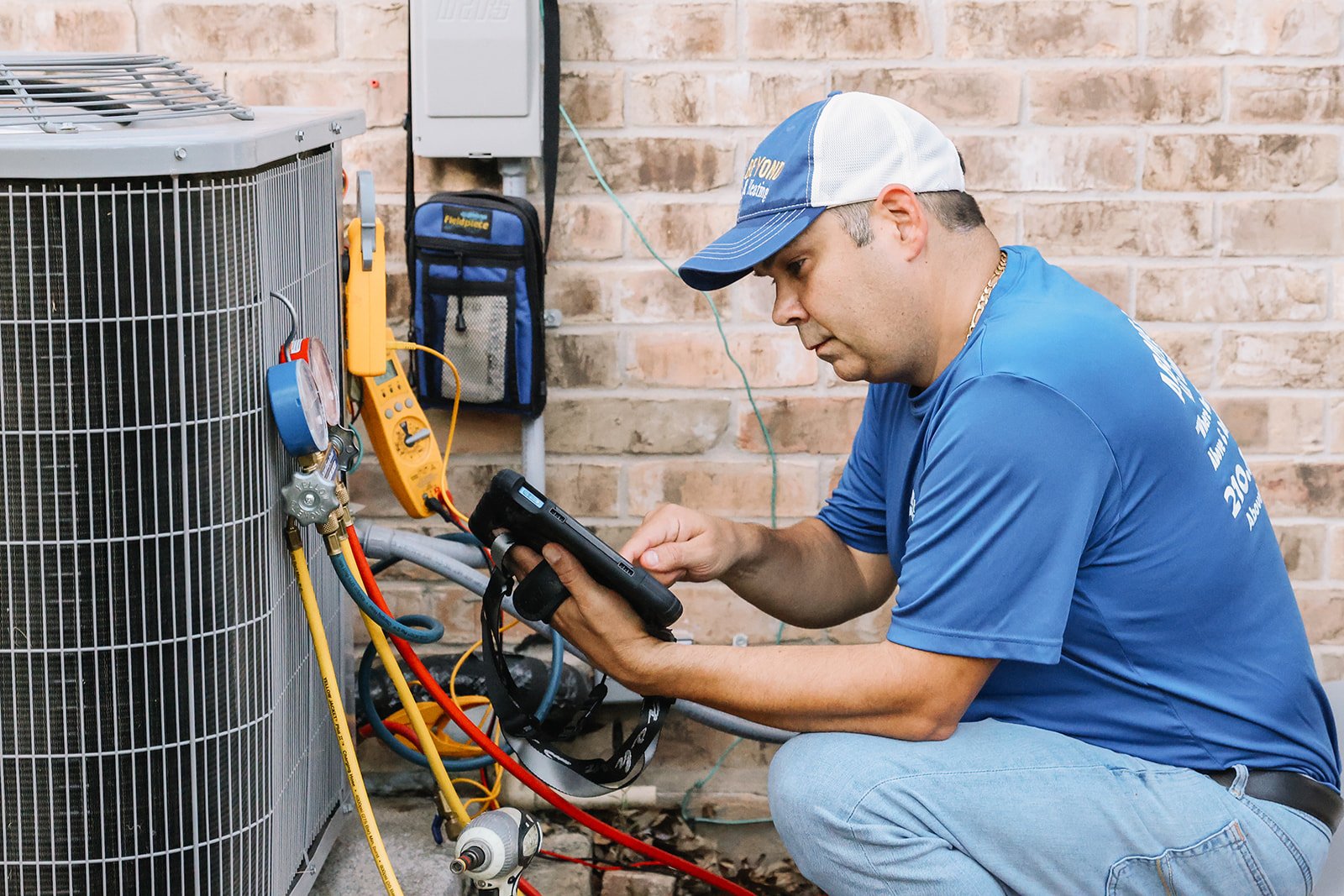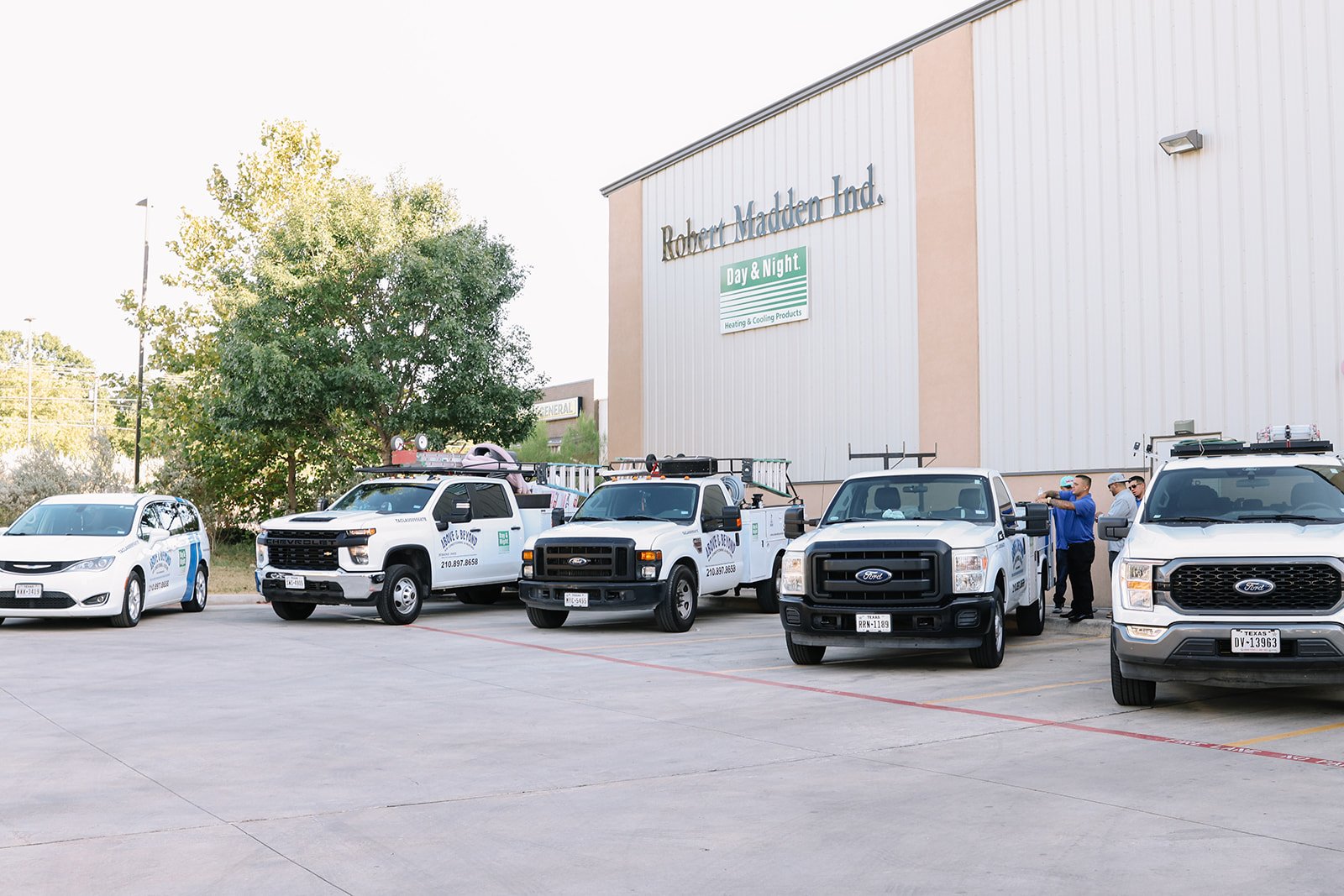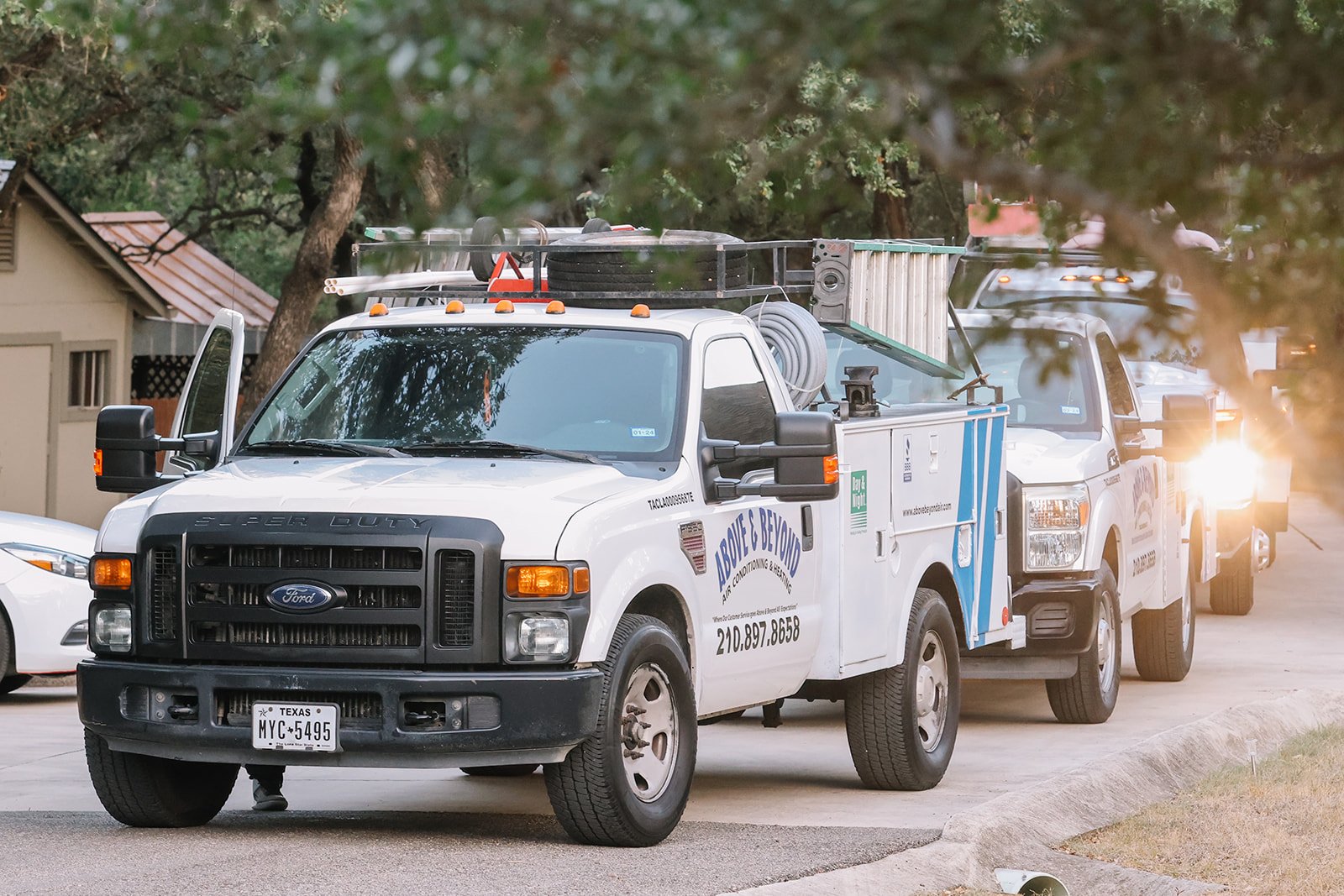
AC Condenser Repair or Replacement in San Antonio, TX
WE SERVE SAN ANTONIO, HELOTES, BULVERDE, CANYON LAKE, NEW BRAUNFELS, SCHERTZ, AND CIBOLO
Homeowners can find the AC condenser in the outdoor AC unit. It allows the heated refrigerant to cool by piping it through a dense condenser, allowing it to dissipate heat into the surrounding air. The condenser’s fan facilitates heat transfer by ensuring air flows appropriately within the unit. The condenser unit ensures that the refrigerant cools down and returns to its liquid form before returning to the evaporator coil for the next heat exchange cycle.
The AC condenser’s complexity means it should remain in excellent condition to operate well. If something goes wrong, the homeowner should have the unit repaired or replace the AC condenser in the worst cases. AC condenser repairs can be costly, and the cost of a condenser replacement runs even higher.
For homeowners looking for a home AC condenser replacement, seek the services of a certified AC expert for repairs. Hiring a cheap unlicensed technician or attempting to make repairs might sound tempting but will usually result in higher costs overall. Improper or misguided repairs can further damage the condenser.
Above & Beyond Air Conditioning & Heating Specializes in AC Condenser Repair or Replacement across San Antonio
Imagine being stuck at home in the sweltering summer heat, dripping in sweat because of a damaged AC condenser. While frustrating and uncomfortable, there’s no need to suffer through the harsh temperatures.
At Above & Beyond Air Conditioning & Heating, we understand the need for a working AC system and are always ready to deliver quality AC condenser repair and replacement services. It doesn’t matter whether the AC condenser issue stems from the capacitor, relay switch, or control board. Our team is well-trained to resolve the issue at hand adequately.
OUR REVIEWS - ac condenser replacement or Repair in San Antonio
Our customer service goes Above and Beyond all expectations.

Cities we Serve
San Antonio, Hollywood Park, Hill Country Village, Timberwood Park, Longhorn, Castle Hills, Balcones Heights, Shavano Park, Leon Springs, Live Oak, HelOtes, Canyon Lake, Schertz, Cibolo, Windcrest, Alamo heights, Converse, Selma, Bracken, Garden Ridge, Northcliffe, Kirby, Cross Mountain, Bulverde, Boerne, Marion, Leon valley, and New Braunfels
San Antonio Neighborhoods We Serve
Prospect Hill, Highland Hills, People Active in Community Effort, Vance Jackson, Alamo Farmsteads-Babcock Road, South-Southwest, Great-Northwest, Dellview Area, Heritage, Palm Heights, Highland Park, Northwest Crossing, Lackland Terrace, Stone Oak, Shearer Hills – Ridgeview, Oak Pk – Northwood, Greater Harmony Hills, Los Angeles Heights – Keystone, Northwest Los Angeles Heights, Quintana Community, Thompson Community, Avenida Guadalupe, Thunderbird Hills, Southwest, Hidden Cove - Indian Creek-Southwest, Rainbow Hills, Sunrise Neighborhood Coalition, University Park, Culebra Park, Mission San Jose, Beacon Hill, Pipers Meadow, Harvard Place Eastlawn, Pecan Valley, Community Workers Council, Laddie Place and North Wilson, Jefferson-Woodlawn-Lake, Kingsborough-Ridge, North Central Thousand Oaks, Sonterra-Stone Oak, Woodlawn Lake, Hot Wells, Third World, Timber Ridge, Donaldson Terrace, Sierra Springs, Greater Gardendale, Friedrich Wilderness Park, Shady Oaks, Tobin Hill, Adkins, Atascosa, Castroville, Lytle, Macdona, Natalia, Somerset, Von Ormy, Alamo Ranch, Bandera, Braun Station, Fair Oaks Ranch, Medina, Pipe Creek, Bergheim, Churchill Estate, Deerfield, Green Spring Valley, Hills and Dales, Hunters Creek, Huntington Place, Monte Vista, Shavano Heights, Spring Branch, Steubing Ranch, The Dominion, Woods of Shavano, Encino Park, Redland Oaks, Seguin, Universal City, Elmendorf, La Vernia, and St. Hedwig
What an AC Condenser Cabinet Contains
Condenser Coil:
The condenser coil holds the AC refrigerant, ensuring that the heat exchange cycle within the AC system is completed. This copper coil varies in shape and size depending on the function. Due to increased surface area, the condenser coil typically contains fine, finned aluminum pipes to help dissipate heat more quickly.
Fan:
An outdoor unit uses a fan to blow heated air away from the condenser coil and bring fresh air in from the outside. This exchange allows the refrigerant in the condenser coil to distribute heat to the air quicker.
Compressor:
The compressor is the primary link between the evaporator coil inside the indoor AC unit and the condenser coil. It pressurizes the refrigerant, forcing it through the condenser coil to enable heat transfer to the outdoors. This process ultimately reduces the air temperature inside the home.
Various controls:
AC condenser units carry a control board that can control the relay switch, capacitor, and motors. These controls can fail at any time, so It’s important that homeowners research and find a reliable professional that they can always call on when a condenser component fails to function correctly. An AC specialist can accurately determine where the problem lies and advise appropriately if other parts require attention.
Problems a Bad AC Condenser Cause
An AC condenser is responsible for cooling down the refrigerant, ultimately ensuring the home temperature remains comfortable. Homeowners who notice a dip in the AC cooling capacity should have their condenser checked by a technician. There are high chances that it is broken.
Odd noises coming from an AC unit, such as rattling and hissing, can indicate damage to parts of the AC condenser. A hissing sound might be due to a refrigerant leak on the condenser coil, while a rattling sound could result from blockage. Because the condenser is in the outdoor AC unit, debris build-up can cause clogging in the AC system, resulting in the rattling sound.
Homeowners should watch out for any refrigerant leaks from the AC. If one notices a greenish fluid leaking from the system, especially the outdoor unit, it may signify the presence of a fracture on the condenser coil.
Bad AC condensers can also cause frosting. The system has reduced pressure, typically caused by lower refrigerant levels. This diminished pressure can stem from fractured condenser coils, which may have caused the coolant to seep out and, in turn, affected the refrigerant levels.
A trained technician should assess any burning smells from an AC unit. If not quickly checked, a faulty capacitor causes the AC unit to overheat and melt other AC components. Property owners should switch off the AC unit once they notice a burning odor from the AC vents to avoid further damage to the unit.

FAQs on AC Condenser Replacement or repair in san antonio
-
The refrigerant running through an HVAC system is a gas or liquid, depending on the heat stage cycle. The compressor jumpstarts this process by pumping and pressurizing the refrigerant in gas form. The pressurized gas then enters the air condenser unit with coils to help the refrigerant cool down in the ambient heat. The refrigerant gas turns to liquid and enters the indoor unit to accept more heat before moving to the compressor again. The compressor and condenser can be both in the outdoor unit (commonly called the condenser itself).
-
If well-maintained, an AC condenser can last between 15 to 20 years. Scheduling routine technical maintenance and removing debris and build-up can significantly enhance a condenser’s lifespan.
-
Signs of a bad condenser are not always limited to the outdoor AC unit. Any loud or odd noises, overheating, or leaks on the outdoor unit, it may be time to replace the condenser or find an AC technician to repair the condenser. Reduced airflow in the AC vents can also be reflective of a bad condenser.
-
On average, replacing an AC condenser costs from $1,100 to $3,900. But, this cost significantly reduces to $280 to $1,100 if the unit is still under warranty. Factors such as the AC capacity, type of condenser coil, and which part requires replacement may impact the final costs of the AC condenser replacement.
-
Depending on the design, homeowners may notice an unusual flashing light on the AC unit to notify them of a refrigerant leak. Water leaks from the unit also signify a fault in the condenser coil that forces the coolant to escape. Another sign of a condenser leak is the freezing up of the unit. The refrigerant cools down any humidity on the evaporator coil and, as a result, freezes up the AC unit.
-
The condenser releases heat from your home, making it a vital part of the cooling cycle. In San Antonio’s relentless summers, even minor condenser issues can reduce efficiency and leave your home uncomfortably warm.
-
Warm air blowing from vents, loud noises from the outdoor unit, and visible refrigerant leaks are warning signs. These issues should be addressed quickly to avoid losing cooling during peak heat.
-
Some issues, like motor or wiring problems, can be repaired. However, damaged coils or major failures usually require replacement. San Antonio homeowners often choose replacement for reliability during long summers.
-
Dust, debris, high outdoor temperatures, and heavy run times all contribute to condenser wear. San Antonio’s climate increases the risk of overheating and buildup around outdoor units.
-
Typically 10–15 years with regular maintenance. Heavy seasonal use in San Antonio may shorten this lifespan without proper care.
-
Repairs may cost a few hundred dollars, while replacement can range into the thousands, depending on the unit. Many San Antonio residents weigh repair costs against the age of their system.
-
Many systems include 5–10-year part warranties. Labor is often extra, but warranty coverage can significantly reduce costs for San Antonio homeowners.
-
No, running the unit with a failing condenser can lead to compressor damage, which is one of the most expensive repairs. In San Antonio’s climate, this can leave your home without cooling entirely.
-
Keep the outdoor unit clear of debris, schedule coil cleaning, and arrange annual tune-ups. These steps help your condenser last longer in San Antonio’s demanding climate.
-
If the unit is relatively new, repairs may be sufficient. For older systems, replacement is usually more cost-effective before San Antonio’s peak summer season.
Homeowners in the San Antonio metropolitan area can always call on Above & Beyond Air Conditioning & Heating for their AC condenser repair and replacement needs.
Our expertly-trained team will always check for freon leaks, thoroughly evaluate all AC system components, and provide solutions that match manufacturer standards. Opting for an authorized service partner ensures homeowners don’t void the appliance warranty.



